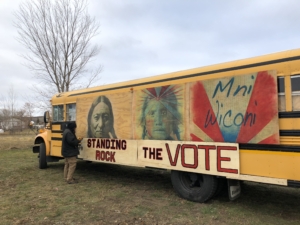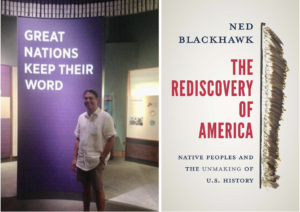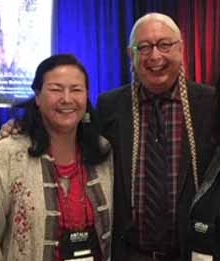“To heal is to be familiar with what was destroyed.”
-Ray Young Bear, Meskwaki

“To heal is to be familiar with what was destroyed.”
-Ray Young Bear, Meskwaki

MICA’s vision and mission statements, crafted in 2005 by our founders, continue to guide our work today. Although our principal work is with tribes and tribal communities, we take seriously our founders’ directive to “raise awareness about the importance of honoring cultural diversity and Indigenous ways of knowing to create a just, humane, and sustainable world,” so we also engage in limited outreach to non-Native communities.
MICA strongly believes that Indigenous voices are needed –in fact they are crucial– if the United States is to reach its highest potential. Indigenous ways of knowing enrich the world, including through our languages, which offer a different way of thinking about the relationship of humans to other living beings and to place. As “people of place,” Indigenous peoples know how to protect and nurture their land. Our science, ecology, and sustainable practices stewarded North America for thousands of years. Indigenous knowledge is a valuable world resource and should be treated as such.
We educate non-Natives because the public has not been told the truth about our country, which was built on taking Indigenous lands by genocide, disease, unethical behavior and broken promises. The labor of enslaved African people and Indigenous peoples (enslaved and forced to build Spanish missions in the western U.S.) built this nation on stolen land so that Europeans could profit and become landowners.
We now share this beautiful country, and it is our responsibility to learn about our joint history so we can honor the dignity of every human being and what they bring to the American experience to create a just, humane, equitable, sustainable world.

Photo by Peggy Mainor
MICA advocates for issues of interest to Native communities, including serving as a fiscal sponsor, planning, fundraising, holding conferences and gatherings, educating policymakers, and strategy.
MICA has worked for several years in partnership with the National Trust for Historic Preservation to ensure that Indigenous voices are heard in the Trust’s public programming, serving as an advisor and creating Native educational programming for the Past/Forward National Conference and the Trust’s online magazine.
MICA Sponsors Keynote Speaker and Native Rights Panel at National Trust Annual Conference
Ada Deer gave the keynote address at National Trust/Live in 2019 sharing moving and inspirational stories from her new book, Making a Difference: My Fight for Native Rights and Social Justice.

Moderated by MICA Executive Director Peggy Mainor, MICA’s panel of inspirational and visionary Native women activists discussed the importance of protecting Indigenous sacred and cultural places, and shared stories about their work. Presenting to a standing room only audience of ardent preservationists, panel members included: Ada Deer (Menominee), former Assistant Secretary of Indian Affairs and the first Native woman to lead the Bureau of Indian Affairs; Mona Polacca (Havasupai and Hopi/Tewa), Senior Cultural Liaison and an active participant in the United Nations Permanent Forum on Indigenous Issues; Bonnie Hartley (Mohican) Tribal Historic Preservation Officer of the Stockbridge-Munsee Band of Mohicans.
Native Views of Historic Preservation: Increasing Awareness

The Rediscovery of America was long-listed for a 2023 National Book Award.
MICA’s 2020 panel brought extensive experience in working to reassess thousands of years of history of their respective communities to the questions, “What are Native views of preservation? How can historic preservationists incorporate social justice and inclusion in their work? What does it mean to tell the full American story?” Panelists discussed efforts to preserve, examine, and better understand the centrality of Indigenous histories in the making of North American landscapes, institutions, and communities.
Moderated by Professor Ned Black Hawk, PhD (Te-Moak Shoshone), Professor of History and American Studies, Yale University, with panelists Governor Brian D. Vallo (Pueblo of Acoma); Laurie Arnold, PhD (Sinixt Band, Colville Confederated Tribes), Director of Native American Studies and an Associate Professor of History, Gonzaga University; Aaron Bird Bear ( Manda, Hidatsa, Diné), Director of Tribal Relations, University of Wisconsin-Madison.

Treaties Explorer received the 2021 Society for American Archivists Award.

As Long As the Grass Grows and the Water Runs: Treaties with Native Nations and their Relevance Today
Moderated by President of the Pawnee Nation and MICA Board member Walter Echo-Hawk, panelists discussed the question, “Are treaties made between United States government and American Indian Tribes relevant today?” and the recent Supreme Court case, McGirt v. Oklahoma, which held that half of Oklahoma is Indian land. Panel members Sherri Thomas, J.D. (Black/Taos Pueblo) University of New Mexico School of Law; Assistant Director, Collection and Systems; Associate Dean of Institutional Climate & Equity; Professor of Law Librarianship, Pamela Wright, Chief Innovation Officer, U.S. National Archives, and Anna Naruta-Moya, PhD, Project Director, Treaties Explorer/Indigenous Digital Archives Collaboration, Museum of Indian Arts & Culture, Santa Fe, NM shared information about Treaties Explorer, a new online tool they created that makes treaties with Native American Nations accessible to all.
MICA recently concluded a series on Native Women Leaders for the National Trust for Historic Preservation’s online magazine, Saving Places. We used the opportunity to celebrate our leaders and to educate readers on how Native history shaped the leaders’ lives and careers.
Esther Martinez, Protecting the Heritage of the Tewa People
Wilma Mankiller, First Woman Chief of the Cherokee Nation (co-founder of the MICA Group)
https://savingplaces.org/guides/wilma-mankiller-first-woman-principal-chief-cherokee-nation
Places that Inspired Poet and Activist Suzan Shown Harjo (MICA Group’s Senior Advisor)
https://savingplaces.org/stories/places-that-inspired-poet-and-activist-suzan-shown-harjo
U.S. Poet Laureate Joy Harjo: A Life in Four Directions
https://savingplaces.org/stories/us-poet-laureate-joy-harjo-a-life-in-four-directions
Follow the Life of Winona LaDuke, Vice Presidential Candidate and Environmental Leader
As Long as the Grass Grows and the Rivers Run: Native American Treaties Today – A Conversation with Della Warrior, President and CEO of the MICA Group, and David Ferriero, Archivist of the United States
MICA maintains a list of 2,150 tribal leadership contacts. We do our best to keep tribes up-to-date on important opportunities for their communities, such as:
FCC Offers Free 2.5Ghz Broadband Licenses to Tribal Nations
MICA was asked by the FCC to assist it in informing Tribal Nations about a limited- time opportunity for tribes to obtain free licenses for 2.5 GHz broadband over their tribal lands. The tribal window will open on February 3, 2020, and close on August 3, 2020. After August 3, the licenses will be auctioned to the highest bidder.
Here is the letter to NCAI announcing the offer from FCC Chairman Ajit Pai.
Here is NCAI’s response to FCC Chairman Pai’s letter.
For more information, see www.fcc.gov/25-ghz-rural-tribal-window.
MICA Hosts Montana/Wyoming Statewide Meeting on FCC’s Free Broadband Offer
MICA will host a Montana/Wyoming statewide meeting for the eight Montana and two Wyoming tribes to learn more about the FCC free broadband offer. The meeting will be held February 4 and 5, 2020. For more information, contact Peggy Mainor, or Virgil Edwards, .
MICA partners with Endangered Language Fund to publish Language Study Review
For Immediate Release: Language Study Review Finds “Language as Treatment” Produces Positive Health Outcomes Among Indigenous People
Funds, resources, and further research are needed to optimize healthy outcomes from language use and revitalization. Please click here for the PDF Press Release.
For more information, contact Peggy Mainor, or Douglas Whalen,.
MICA occasionally accepts consulting opportunities for organizations interested in working with Native Communities. We recently completed a one-year consultancy with The Wilderness Society. As part of our work, we presented a discussion with Philip Deloria, Professor of History, Harvard University, and Karl Jacoby, Professor of American History, Columbia University and author of Crimes Against Nature: Squatters, Poachers, Thieves, and the Hidden History of American Conservation, on the Native origins of America’s National Parks – another trail of broken treaties.
 Apache Stronghold leaders Wendsler Nosie |
|